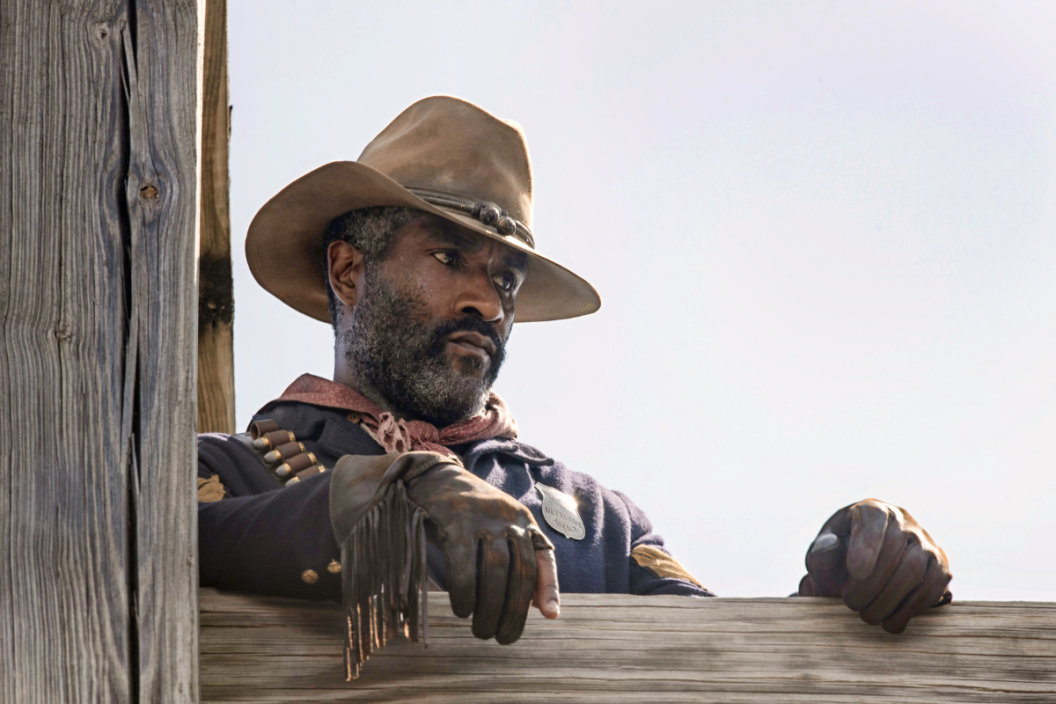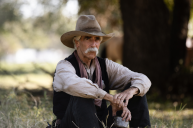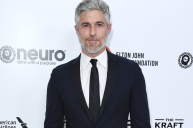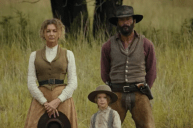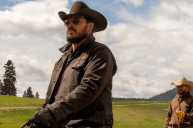With 1883 set to finally make its terrestrial TV debut on the Paramount Network on Sunday, June 18, it's a great time to revisit the series, which stars Tim McGraw and Faith Hill as James and Margaret Dutton, the first members of the Dutton clan to lay claim to the land that the Yellowstone crew now occupies. The epic series is full of tragedy and conflict, all of which serves as a reminder that life in the 1880s — and especially on the Oregon Trail — was no picnic.
Videos by Wide Open Country
It was certainly no picnic for LaMonica Garrett's character, Thomas, a buffalo soldier turned Pinkerton detective agent who teams with Sam Elliott's character to lead the Duttons and others out West. Though Thomas ultimately finds love and a homestead out in the Willamette Valley, his life had been a series of hardships, something that certainly showed on the character's face.
In real life, though, Garrett is a sprightly 48 and looks nowhere near as weathered or grizzled as his cowboy counterpart. A former pro athlete turned actor, he's set to return to Taylor Sheridan's sphere in the creator's new series, Special Ops: Lioness, in which he plays a CIA operative with a badass pedigree and skills to match. The show stars Zoe Saldana, Morgan Freeman and Nicole Kidman.
Wide Open Country caught up with Garrett before 1883's TV debut to talk about what fans can expect from Lioness, as well as why his stint in the saddle convinced him to trade in his Jordans for cowboy boots.
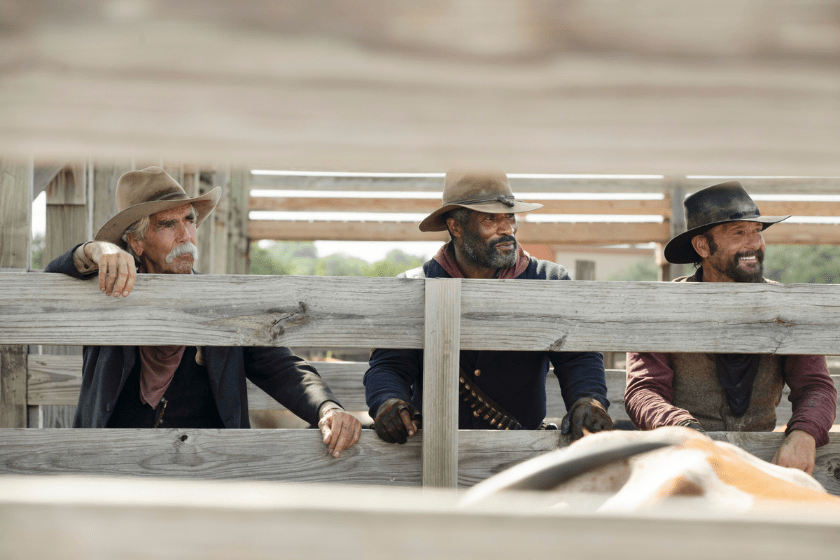
Emerson Miller/Paramount+
Wide Open Country: 1883 first premiered on Paramount+ in late 2021, so it's been out in the world for a second now. What has your journey been like with that show, and what's been great about the response?
LaMonica Garrett: When I read the scripts, I knew it was going to be something different and something new that I hadn't experienced before. And when we were shooting it, we knew it was that as well.
There was this time when me and Sam [Elliott] were sitting on our horses watching the wagon train come towards us. It was in one of the early episodes. Sam just stared at the wagon train and said, "I've never seen this in my whole life." And this is coming from Sam Elliott! Think of what he's done in his career.
I mean, I'll probably never see something like that again, either. Most of the time nowadays, if you see a 28-wagon train on a show or in a movie, it's usually CGI. And back in the day, they didn't have that many at once, either. It was maybe four or five or six.
But to see the magnitude of these sets! Tom Hanks came on to do like a day with us, and he was like, "I thought I was doing a Western! It looks like you're shooting Star Wars. This is massive!"
It just changed all of us. Even when we finished shooting, and we were coming back home to civilization, like, I wear a lot of Jordans, but since 1883, I've been wearing a lot of cowboy boots. I've been riding a few times a month, too, just finding ranches out here where I can go ride. There's something about being out in nature that I really need after filming something like that.
Most of the time, when you film you're in a studio, you're hitting a mark, and you're saying words. We were out in nature for over six months, whether it was 180 degrees in Fort Worth or 8 degrees in Montana. We were really out there doing all this stuff. It was miserable while we were doing it, but when we left, it was like, "I want that again." So it sticks with you.
WOC: Facing the elements together has to be a bonding experience, in some sense.
LG: All that we had was each other. It was still a heavy COVID era, so we were still in our bubble. At night, normally everyone goes home or goes to the bar, but we just went back to the ranch. We would eat dinner together after we got off work, and then the next day, you'd wake up, you'd have breakfast together, you'd have lunch together, and you'd have dinner together. We did six months of that.
We were on these ranches with no Wi-Fi, no TVs, and cell service was limited. We went to the premiere in Vegas while we were still shooting the show, and it was like we had to recalibrate our eyes for all the lights. It was like, "Oh, wow, it's nice to be in a nice bed with room service."
We were really living that 1883 experience, and I think that's why people love the show, because it's authentic. You can tell that we were in it.
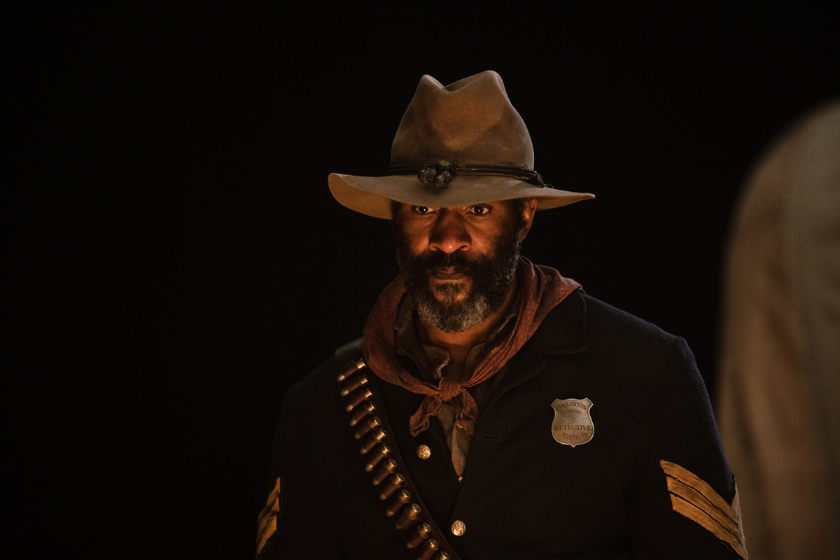
Emerson Miller/Paramount+
WOC: You did quite a bit of research about Black cowboys to play Thomas. What are some of the pieces of information that have really stuck with you?
LG: I mean, just how many Black cowboys there were in that time period. I grew up watching Westerns, and I didn't see a lot of Black cowboys in those. So if you don't see it, you just don't process them being there. But then you start doing research, and you learn that one in every four cowboys was Black, and you learn about how, back during slave times — when the plantation owners would go away to war — the people left on these plantations to work the cattle and work the horses were the slaves, so they became great horsemen. When it came time for them to join the Civil War as buffalo soldiers or the cavalry, they were right at home on horses.
After slavery was over, they were able to transition into being cowboys, too, and it was a seamless transition. Their contribution to Western expansion is not always represented, but they were there, and it was Taylor writing that character that made it resonate with me.
WOC: Speaking of Taylor, you must have made a good impression, because you're in his new series. What can we expect from Special Ops: Lioness?
LG: I was in Vegas working. We were at a UFC fight promoting another show, and I got a call from my agent. I'd had a couple of drinks, but they were like, "Do you want to be in Taylor's new show called Lioness?" And I was like, "Yeah! What's it about?" They said, "Oh, it's got Nicole Kidman, Zoe Saldana, ..." and I was just like, "Stop. I don't even need to know what it's about. I don't know what my role is, but I'm in."
WOC: Morgan Freeman, too!
LG: I didn't even know Morgan was in it until we got to set. I saw Morgan eating breakfast in the hotel that we were at in Spain, and I was like, "Oh, wow. Morgan Freeman is here. I wonder what he's filming!" And then, the next day, I saw him on set.
Taylor does that. We didn't know Tom Hanks was going to be in 1883. We didn't know Billy Bob Thornton was going to be in 1883 until a day before. We just saw him on set. That's the Taylor Sheridan effect, because everyone wants to work with Taylor because of his writing.
WOC: Why is that?
LG: He was an actor first, so it's a unique experience working with him. He knows the way actors think. He knows the dialogue, the back and forth, and how to get through to us. He writes these characters, and then he showruns, and it's a perfect environment for working actors.
That's why a lot of my acting buddies hit me up like, "Hey, I have an audition for Taylor coming up. What can you tell me?" Everyone's trying to get aboard, because you can go a whole career without having this kind of material, and when you get it even just once, you don't want to go back.
That's why these big A-list film actors are coming to television to work with Taylor, because it's shot like a film. It's not shot like television.
WOC: Tell us about your Lioness character, Tucker. He's in the CIA Special Activities Division, so I have to imagine there was some training there.
LG: We had weapons training, and we had quick-reaction training with three other guys and two other gals. It was maybe a month before shooting.
Everyone who trained has a different background on the show, though. Tucker was a Marine raider. He was a badass Marine, and now he's working with the CIA. There's a character that was in Delta Force. There's a character that was a Navy SEAL. The lead character is another Marine.
This program, the Lioness program, is an actual Marine program that came about in 2005 or 2006. So it's an authentic story, but it's something we haven't seen before.
I think it's going to be game-changing. I was watching the trailer for the first time, and it gave me chills. Everybody's perfect for their roles.
WOC: And you get to look your age! Which, no offense to Thomas in 1883, but he was looking a little rough for his age. Then again, he'd had a hard life. Maybe that's what 40-somethings looked like then.
LG: It's dog ears out there. If you're 25, you look like you're 40. It was a harsher time.
A lot of people don't recognize me from the show because I don't look like Thomas. When they put two and two together, they're always like, "Oh my God, you look so much different!" I'm always like, "The Oregon Trail that did that."
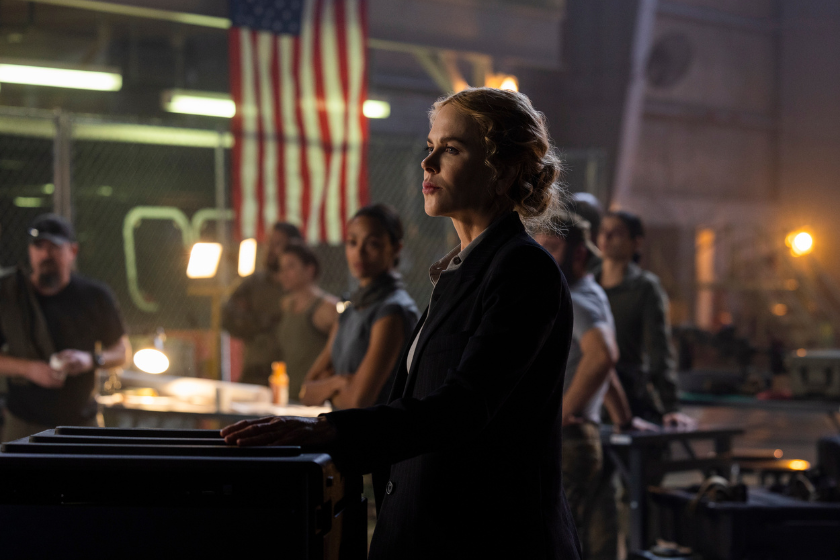
Nicole Kidman in Special Ops: Lioness. (Greg Lewis/Paramount+)
WOC: Like you mentioned, Special Ops: Lioness is packed with a lot of star power, including Nicole Kidman, Zoe Saldana, Morgan Freeman ... even Martin Donovan has been in a lot of great movies. What did you learn from working around those legends?
LG: Every job I'm on, I tried to learn something from the people that I looked up to. I've been blessed to work with some really great actors that I used to watch when I was younger, and the thing that they all have in common — this set included — is their professionalism. It's how they treat the work, how they treat the craft, and how they show up to work each day and carry themselves.
It's funny: Zoe can be chatting, but as soon as the cameras are rolling, she turns into this character. It's the same for Nicole. When it's over, it all falls off, though. They don't wear their roles home. To see how they could turn it on and just be this completely different whoever it is, and think about what that requires? To just let it go? They'd finish a take and be like, "Hey, where are we going to eat after we leave here?"
It's just a level of professionalism they all have. They're the first ones there in the morning, and they're the last ones to leave. And you learn from that, because when they're leading the ship, you better follow right behind in that same model.
WOC: Acting wasn't always your career path, either. When you were a kid, you thought you were going to be an athlete, and you did go pro for a time. You've been acting for a while now, at this point, but how have you gone about catching up with your peers or digging into the actual educational process that goes behind acting? Were you taking classes, were you doing acting school? Or did it just come naturally?
LG: I got started late, and that was to my detriment. The guys I was going up against in these rooms and auditions, they had been child actors, or they went to Yale or Juilliard. They had all this training, and I didn't.
There's no structure with acting, though. Some people show up, and it hits right away. Some people are like Morgan Freeman, who was in his mid-to-late 40s when he really got going. There's no law school process, like I went to law school, I passed the bar, and now I'm a lawyer.
I had to try to find my village when I moved to LA. I had to figure out what acting classes I could go to, and which ones were good acting classes, like the ones that aren't just taking your money but you're actually learning the craft.
The longer you're out here, the more people you meet. You're just kind of finding your way. For years, I was just in acting classes nonstop. I would do commercial work, and I would do background here and there, but I had a job at FedEx. I was doing what I could. Some people wait tables, some people drive Uber ... you try to make as much money as you can to pay rent and to pay for acting classes. I did that for years and slowly just found my way. And, you know, you keep at it. Coming from an athletic background, I know with a work ethic and discipline and hard work, I'm going to see the results I want to see. I just had to be patient and trust the process.
READ MORE: '1883': How to Watch the 'Yellowstone' Prequel Starring Tim McGraw & Faith Hill
